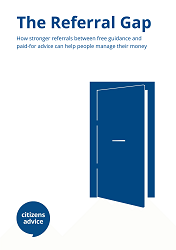The referral gap - how stronger referrals between free guidance and paid-for advice can help people manage their money
 Money advice has become increasingly important to families’ financial security as people face more unpredictable incomes and have more freedoms in managing their finances. As money advice markets become better equipped to provide for this changing need, the focus needs to shift towards some of the other barriers which prevent people from accessing advice.
Money advice has become increasingly important to families’ financial security as people face more unpredictable incomes and have more freedoms in managing their finances. As money advice markets become better equipped to provide for this changing need, the focus needs to shift towards some of the other barriers which prevent people from accessing advice.
The referral gap - how stronger referrals between free guidance and paid-for advice can help people manage their money [ 0.95 mb], finds that people frequently raise their money issues at first with professionals such as doctors, banks or councils. When these professionals are not able to offer help directly they need to be able to refer clients onto appropriate and timely money advice. However, this doesn’t always happen and around 3.4 million people who have raised money issues with a trusted professional don’t receive advice or a referral, and thus fall into the ‘referral gap’.
This report focuses specifically on the referral gap between free and paid-for money advice. Our survey of Citizens Advice advisers found that 83% felt confident making referrals to other free advice but only 29% felt so for paid-for advice[1].
Advisers and staff working in the free and paid-for advice sectors describe a polarised market with underdeveloped referral routes. In many cases referrals do not take place between general money guidance and regulated financial advice. Where they do, they often amount to little more than a signpost.
This creates problems, especially when people need different types of advice at the same time. For example, someone may need regulated financial advice on the best option for releasing equity from their property, but may simultaneously need broader guidance to help them understand the impact on any means-tested benefits.
In a well-functioning system free guidance and paid-for advice should complement each other in these situations. Good referral systems are crucial to this and this report argues that they should be built on four foundations:
-
Cross-sector partnership and strong relationships between different types of advice providers
-
Shared knowledge of the needs and capabilities of different providers
-
Mutually agreed policies for handling referrals
-
Secure digital referral systems to increase efficiency
A successful referral network has the potential to increase the number of people who access appropriate money advice at the right time, and significantly improve financial outcomes for these individuals.
1 Figures are from the Citizens Advice Network Panel which is completed by general advisers, staff and volunteers from local Citizens Advice offices. It does not reflect the confidence of Pension Wise staff or money and debt advisers in isolation.

